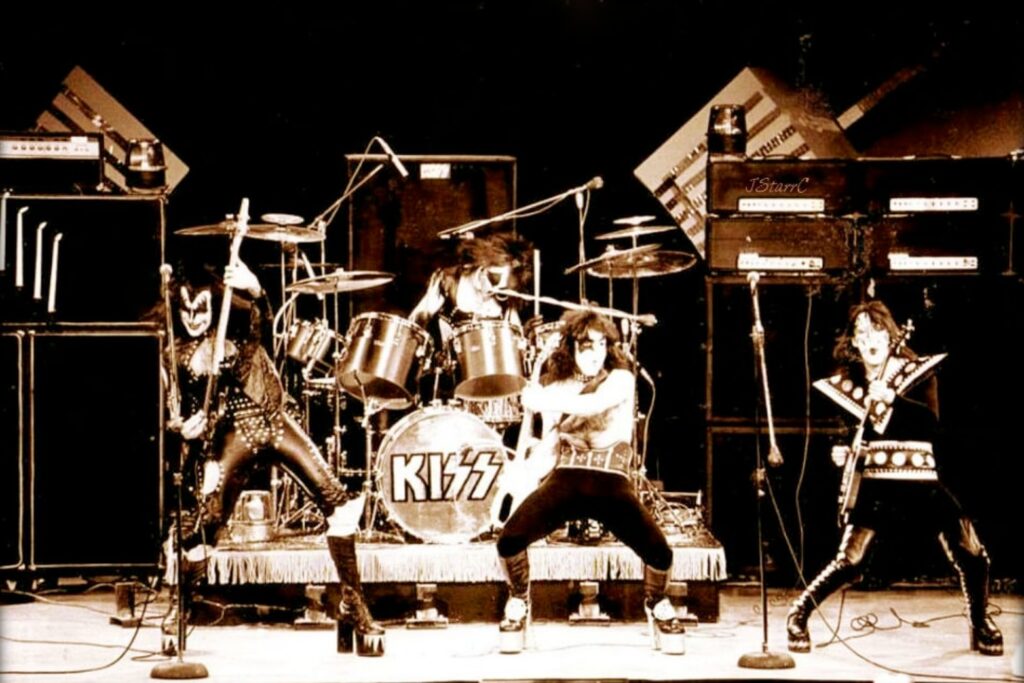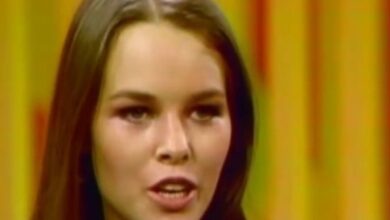Ace Frehley and KISS Set Rock History Ablaze with a Blistering Performance of “Black Diamond” on The Midnight Special
When KISS stormed onto NBC’s Burbank stage to unleash “Black Diamond” on The Midnight Special, the atmosphere cracked with voltage. It was July 11, 1975, and by then, the band had already become masters of fusing spectacle with sound. The studio was intimate but felt like an arena in miniature — the lights sharp, the makeup brighter than ever, and the tension visible before the first note hit. This was not just another TV appearance; it was the ignition point of rock theater finding its broadcast form.
“Black Diamond” didn’t begin like an explosion — it crept in quietly, almost deceptive in its tenderness. Paul Stanley’s soft opening set a fragile calm that shattered seconds later when distortion slammed into gear. The transformation was shocking, cinematic. Suddenly, the calm turned to chaos, and the sound thickened into something muscular and alive. The band didn’t just play loud — they played with the precision of a machine and the soul of a riot. For viewers tuning in, it was a wake-up call wrapped in face paint and feedback.
Peter Criss’s vocals turned the track into a miniature opera — rough around the edges yet commanding in its heart. His growl sat perfectly over Gene Simmons’ thunderous bass and Paul Stanley’s sharp-edged rhythm. The shift from lullaby to assault revealed a group that instinctively understood drama. They didn’t rely on special effects or editing tricks; their chemistry was the spectacle. “Black Diamond” wasn’t a song anymore; it was an unfolding scene, performed in real time for the whole country to witness.
Then came Ace Frehley’s turn — his solo still studied by guitarists half a century later. His playing that night was pure intuition: fierce yet fluid, melodic yet unpolished. Every slide screamed urgency; every pause, restraint. The limitations of 1970s television couldn’t cage his tone. Even through the grainy broadcast, Ace’s guitar sliced through the mix like lightning. It was effortless brilliance — not overplayed, just perfectly poised, shimmering like chrome beneath the lights.
What made The Midnight Special unique was its honesty. It stripped away smoke and explosions, forcing artists to stand bare before the audience. For a band like KISS, that was both a risk and a revelation. Without pyrotechnics to hide behind, their musicianship had to carry the show — and it did. The close-ups caught everything: Paul’s cues to the band, Peter’s rhythmic precision, Gene’s sly grins, and Ace’s half-smirk as he leaned into another impossible bend. It was pure, unfiltered rock caught on live television.

Every coordinated step and flick of the head seemed choreographed, yet it felt spontaneous. Those moves that critics once mocked as showy were, in truth, precision-engineered extensions of the music itself. The synchronized struts, the mirrored gestures — they created a visual rhythm as powerful as the sound. On that small NBC stage, KISS performed as if they were headlining Madison Square Garden. “Black Diamond” became a performance painting in motion, the band writing its legend frame by frame.
Unlike “Deuce” or “She,” which had aired earlier, “Black Diamond” arrived last, almost ceremonially — a finale disguised as an aftershock. It cemented what the other performances hinted at: this was a band of precision, not just pyrotechnics. When the episode aired, KISS stopped being an underground phenomenon and became a cultural eruption. America wasn’t just watching four guys in makeup; they were watching discipline masquerading as chaos, beauty carved out of distortion.
At its heart, the power came from the rhythm section. Gene and Peter created a groove dense enough to hold up a skyscraper. Peter’s drumming was all muscle and intent, Gene’s bass heavy yet melodic, their interplay pulsing like one heartbeat. Together, they transformed the track from a mere song into something ritualistic. Even through television speakers, you could feel the pulse, the tempo crawling under your skin. It was both hypnotic and exhilarating.
And then came that haunting outro — a slow-motion collapse of sound. The tempo fell apart deliberately, every note stretching toward silence. The lights dimmed, shadows flickered across the stage, and the band let the chaos dissolve into something cinematic. It was a brave ending, one that demanded the audience’s full attention. Instead of a blaze of fireworks, KISS chose gravity — a fade-out that pulled everyone down to earth before vanishing completely.
That night, Ace Frehley added another immortal moment to his legend. His playing wasn’t about speed; it was about feel, space, and identity. He had a way of making even the simplest line sound like it had a heartbeat. Watching the performance now carries a heavier meaning. In October 2025, Ace — the original Spaceman — passed away at seventy-four. His sound, his stance, that effortless cosmic swagger — it all remains suspended in that broadcast, captured forever in glowing tape reels and the hearts of fans who still replay it.
Revisiting The Midnight Special today feels almost spiritual. Ace’s grin, his fluid phrasing, the glint of his Les Paul under stage lights — they all hit differently now. What once felt like showmanship now feels like legacy. That outro solo, once a thrill, now sounds like a goodbye whispered through amplifiers. You don’t just watch it; you feel it — a reminder that true rock icons don’t fade, they resonate.
“Black Diamond” has aged like prophecy. Its themes of resilience and transformation mirror not just the band’s rise but Ace’s entire arc — from smoky New York clubs to national television, from anonymity to immortality. Every chord from that performance feels heavier now, charged with memory. It was more than entertainment; it was a time capsule of a band pushing sound and image to their limits.
In a world where modern performances are airbrushed, edited, and tuned into perfection, “Black Diamond” remains defiantly raw. It’s a reminder of an era when imperfection was power — when musicians bled through their instruments and audiences felt it. The footage doesn’t age; it breathes. Each cymbal crash, each squeal of feedback, still hits like live thunder from a time when rock was human, flawed, and fearless.
KISS’s “Black Diamond” on The Midnight Special stands as one of the defining moments of televised rock history. It captured four artists at their peak — wild, hungry, and unafraid. With Ace Frehley’s passing, the performance transcends nostalgia; it becomes memorial. It’s no longer just a piece of history — it’s the sound of four men burning in real time, with one of them now eternal among the stars.





